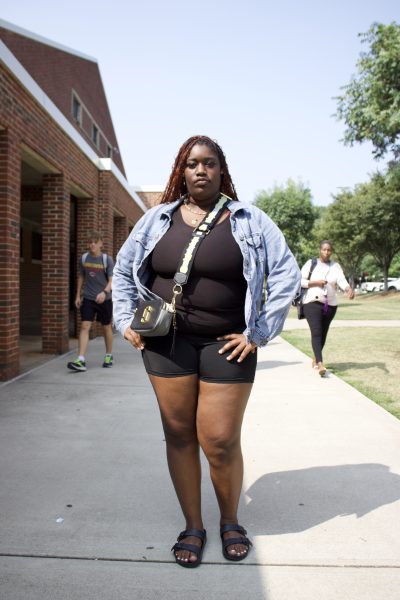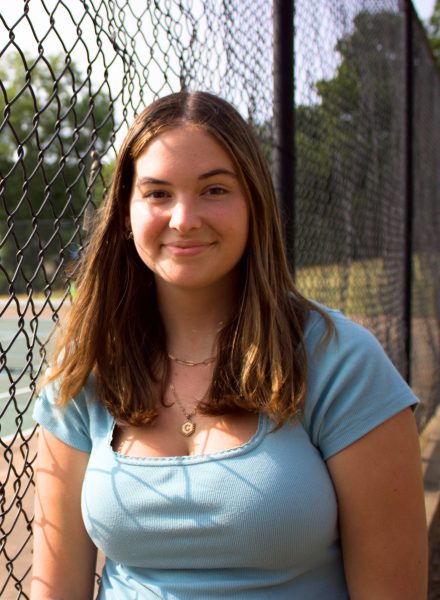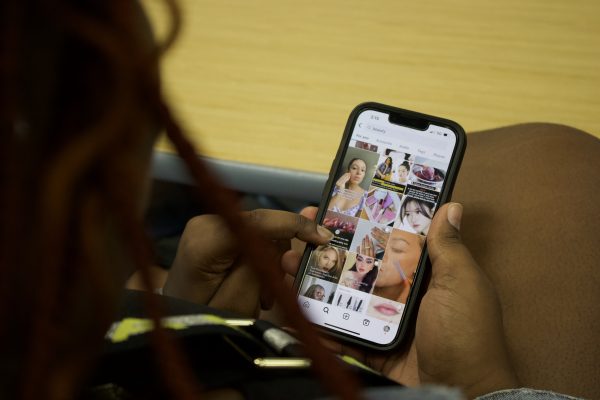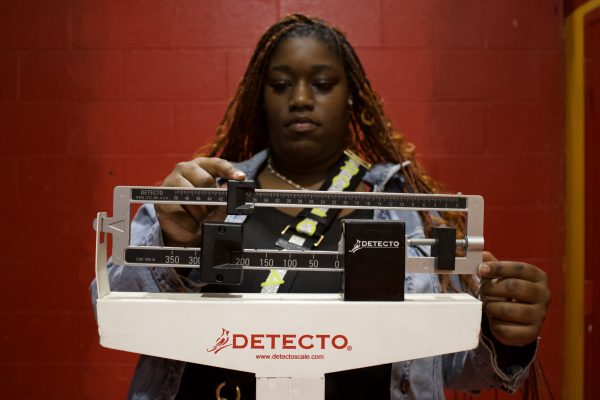
Clarke Central High School senior Kyra Wade poses on CCHS’s campus on Sept. 10. While Wade has found confidence in her body image, she has also discovered tension between her masculine dress sense and conventional gender norms. “I got my scarf, and then I went into my mama’s room to show her what I had on (and) to ask her (if) it (looked) right. She said, ‘Dang, you look like a boy,’ Wade said. “How (does) what I have on top of my head define me?” Photo by Wyatt Meyer
From unhealthy weight loss to social media diets, beauty and body standards are negatively impacting CCHS’ female students.
Kyra Wade is a self-proclaimed “big girl,” and proud of it.
Wade, a Clarke Central High School senior, exudes confidence walking down the hallway to her fourth period literature class. Outfitted most days in an extra large tank top and shorts, Wade is recognizable not only by her heavy-set stature but by her characteristic lack of makeup and a wide, gap-toothed smile.
Wade’s body is an outlier in a society that prizes conformity, but she doesn’t allow others to hold her back. Instead, she projects positivity.
“I want to let other people (who are) this shape or (who) look like me (know) that it’s okay that you’re shaped and look that way. Just be you.”
— Kyra Wade, CCHS senior
But it hasn’t always been easy for Wade, or the hundreds of other girls at CCHS, to accept their bodies. Beauty standards, cultural ideals used for thousands of years to measure a person’s attractiveness, are present today social media workouts, mascara-black eyelashes and body-con dresses.
Caught between individuality and popular culture, CCHS’ female students are wrestling with beauty standards, old and new, in the Digital Era.
“Beauty standards are growing, especially with the world becoming more globalized and, not necessarily accepting, but seeing more women. For example, darker skin is becoming more beautiful, but other things such as being plus-sized or mid-sized (are) still very stigmatized,” CCHS junior Shelby McDaniel said.
When CCHS junior Noa Tatum scrolls through her TikTok For You page, most of the posts she sees are wellness videos or blogs. Although Tatum enjoys deriving inspiration from them, she feels they’re not always positive.
“(There are) some influencers on TikTok that are trying to help, (with videos) like, ‘What I eat in a day,’ or, ‘What I do to work out,’ but sometimes it doesn’t always help (and) makes it worse, because then (viewers) think, ‘Oh, she looks so good. I should work on that.’ It might not end well,” Tatum said.
“Beauty standards are growing, especially with the world becoming more globalized.”
— Shelby McDaniel,
CCHS junior

Clarke Central High School girls varsity tennis player Caroline Goldman, a senior, stands outside the CCHS tennis courts on Sept. 10. Goldman found herself becoming more aware of how she looked when University of Georgia students photographed the team during matches and practice, which distracted her from playing. “Having a thought in the back of my mind (saying), ‘Is my back straight? Do I look good? Is this angle right?’ (is) exhausting at some point,” Goldman said. “I should be focused on, ‘Okay, my serve needs to go in. The shot needs to go in. I gotta hit this backhand good,’ but half the time I find myself, if there’s a camera nearby, (posing) a little bit.” Photo by Wyatt Meyer
Many social media platforms, including Snapchat and Instagram, utilize filters and Artificial Intelligence to enhance or alter photos. Repeatedly seeing these can be dangerous, according to Alexis Lygoumenos, a graduate teaching assistant at the University of Georgia’s Institute of Women’s Studies.
“When you get used to seeing skin through a filter, you think that’s what skin looks like, and it damages your perception (in) your everyday life. You’re setting yourself up for failure because you can’t achieve (the look of a filter). No one can achieve that, even those models and actors,” Lygoumenos said.
While social media plays a large role in the spread of beauty standards, peers can also promote them. When she was an elementary and middle schooler, Wade wanted to fit in, which she said pressured her to sometimes change her appearance.
“I (wanted) to be friends with (this group), so I (started) acting like them, hanging around them and they weren’t the best group of girls. I felt like I needed to do what they were doing,” Wade said. “If we were going to parties together, (and) they had on something, I’ll be like, ‘Oh, my outfit (is) a little ugly. Let me change and put something on like they got on.’”
When dual-enrolling at UGA, CCHS senior Caroline Goldman sees many female students with the stereotypical Pan-Hellenic look: blonde hair, Lululemon tank tops and tennis dresses. As Goldman sees these features
repeated day after day, they influence how she presents herself.
“I find myself conforming to those items of clothing or what to look like. I just got my hair highlighted and everyone’s going bleach blonde. Everyone’s trying to look the same so we fit in and we’re accepted. I don’t know if that’s the right thing to do because it takes away from people’s authentic selves,”
Goldman said.
“Who you are is what
identifies your beauty.”
— Cherelle Pass,
CCHS head varsity flag football coach
“Who you are is what
identifies your beauty.”
— Cherelle Pass,
CCHS head varsity flag football coach

Clarke Central High School senior Kyra Wade scrolls through posts on her Instagram Search &
Explore page on Sept. 10. When CCHS junior Noa Tatum is on social media platforms, she sees people she wants to look like, but knows this can have detrimental impacts on her health. “I try to figure out ways where I can look like (the people I see), but it doesn’t always lead on a good path. Sometimes it might lead to me overthinking about what I’m eating or (the) exercise that I’m (doing),” Tatum said. Photo by Wyatt Meyer
As a CCHS girls varsity tennis player, Goldman is also exposed to contradictory beauty standards directed toward female athletes. Goldman has observed her teammates doing their makeup and hair in ways that remain set during matches to make it seem as thougt they haven’t been on the court at all.
“I think athletes (are expected) to be muscular, competitive and fierce, but at the same time, female athletes have to look put together all the time,” Goldman said. “Even when they’re sweating, tired and exhausted, they still have to look pretty and presentable for the crowd.”
CCHS head varsity flag football coach Cherrelle Pass observes this double standard in some of her players, but she believes that beauty depends on character and integrity rather than superficial characteristics.
“Who you are is what identifies your beauty. I have players who wear lashes and wear their hair in particular ways for games, and then I have people who (are) like, ‘I woke up like this, and this is how I’m gonna be,’” Pass said. “At the end of the day, they (both) go out, compete and do what they need to do.”
When teaching her classes, CCHS physical education department teacher and assistant varsity tennis coach Evan Adams has had some students ask her about their health – a subject she approaches boldly.
“(In my class) we do a health literacy assignment where students are taught where to get health information and where not to. I specifically talk about not (getting) health fads from TikTok, because anyone can say they’re a doctor or a nutritionist,” Adams said. “If (students) come up to me, personally, I don’t push diets. (Instead), I push being healthy and mindful.”
“I love to cheer on the kids. I want to make them feel good in their skin. With me being plus-sized and a health teacher, I feel like I get to practice what I preach.”
— Evan Adams,
CCHS physical education department teacher and
assistant varsity tennis coach
“I love to cheer on the kids. I want to make them feel good in their skin. With me being plus-sized and a health teacher, I feel like I get to practice what I preach.”
— Evan Adams,
CCHS physical education department teacher and
assistant varsity tennis coach
Adams was recently diagnosed with breast cancer and has undergone chemotherapy, changing her outward appearance. However, as a plus-size teacher and athlete, Adams chooses not to let outward beauty judgments about her hair loss or weight define her or her students.
“I love to cheer on the kids. I want to make them feel good in their skin. With me being plus-sized and a health teacher, I feel like I get to practice what I preach,” Adams said. “I’m exercising, I’m active, but I still am technically overweight by beauty standards, and here I am rocking it out and feeling good.”
“Just be yourself and take it one step at a time, one piece of clothing at a time.”
— Kyra Wade, CCHS senior
According to CCHS mental health counselor Dr. Meg Huntington, students can find support in the CCHS counseling department if they feel dissatisfied with their bodies. One thing that Huntington recommends to students is to be conscious of their self-perception.

Clarke Central High School senior Kyra Wade weighs herself on a scale outside the CCHS wrestling practice room on Sept. 10. When she was younger, Wade felt the need to change herself to fit in with her friend group, but started to find confidence in herself during the COVID-19 pandemic. “As I ventured out and grew away from them, I started to find myself and stuff I like to do, not just everything else other people like,” Wade said. Photo by Wyatt Meyer
“Instead of focusing on the problem, which is using other external sources for your sense of, ‘Is this right or wrong, healthy or not,’ check in with your own body. ‘How do I feel right now?’” Huntington said. “‘If I wear an outfit that is comfortable, expresses who I am and makes the statement I want, how
do I feel’? versus if I wear an outfit that somebody else liked that I don’t feel comfortable in.”
Accepting her body and gaining confidence was a trial and error process for Wade, but she encourages others to take the time to do the same and explore who they are.
“It took me a long time to get comfortable in my own body and do what I wanted to do (and) wear what I wanted to wear. You’re not gonna know if you (going to) feel comfortable or uncomfortable if you don’t ever buy the clothes (or) try to wear them,” Wade said. “Just be yourself and take it one step at a
time, one piece of clothing at a time.”